|
Dusty Dog Reviews The whole project is hip, anti-academic, the poetry of reluctant grown-ups, picking noses in church. An enjoyable romp! Though also serious. |
|
Nick DiSpoldo, Small Press Review (on Children, Churches and Daddies, April 1997) Children, Churches and Daddies is eclectic, alive and is as contemporary as tomorrow’s news. |



|
Kenneth DiMaggio (on cc&d, April 2011) CC&D continues to have an edge with intelligence. It seems like a lot of poetry and small press publications are getting more conservative or just playing it too academically safe. Once in awhile I come across a self-advertized journal on the edge, but the problem is that some of the work just tries to shock you for the hell of it, and only ends up embarrassing you the reader. CC&D has a nice balance; [the] publication takes risks, but can thankfully take them without the juvenile attempt to shock. |
|
from Mike Brennan 12/07/11 I think you are one of the leaders in the indie presses right now and congrats on your dark greatness. |
Volume 230, March 2012
Internet ISSN 1555-1555, print ISSN 1068-5154

front cover image by Oz Hardwick
see what’s in this issue...
Note that in the print edition of cc&d magazine, all artwork within the pages of the book appear in black and white.
|
Order this issue from our printer as a a $7.67 paperback book (5.5" x 8.5") perfect-bound w/ b&w pages |

poetry
the passionate stuff
The Seven Deadly Colors: Green
Bob Johnston |
Bob Johnston BioBob Johnston is a retired petroleum engineer and translator of Russian scientific literature. He waited until his sixtieth year to start writing fiction and poetry, and over the next thirty years he has been trying to catch up. He lives in the original Las Vegas, New Mexico with his wife, three cats, and some hope of completing his memoirs and the Great American Novel.
|
PleaseDan Fitzgerald
Her eyes watched my face
|
The OakJoseph Hart
I’m an oak that’s broken from the storm.
|
On Not Being CrazyJoseph Hart
I take my medication. I’m not crazy.
|
Kill a man in Afghanistan, he stays with youFritz Hamilton
Kill a man in Afghanistan, he stays with you,
You try to deny him, but he’s always there,
It would be the same in Iraq.
I can’t sleep thinking of the Afghan man I shot.
He walks with you everywhere you go.
Go to war & watch your spirit die. !
|
Let’s bomb the Greenpeace yachtFritz Hamilton
Let’s bomb the Greenpeace yacht.
That’s more important than a big mammal
So let’s murder him for a few good bites.
He’ll make a good tuna sandwich or two.
even if it’s not as fun as genocide,
All the more reason to sink the Greenpeace yacht !
|
| John reading the Fritz Hamilton cc&d 3/12 issues poem (that was also published in the issue collection book Cultural Touchstone) Let’s bomb the Greenpeace yacht |

Watch the YouTube video of John reading this poem at the Chicago open mike the Café Gallery (at Gallery Cabaret’ 4/25/12) |
The Last StetsonVirginia Fultz
The young man lost his Stetson
He fell in behind an approaching snow
“ They shut the road behind the snow
“ But you’re here. You’re safe. You can
The hat he lost that night was the last
|
About Virginia FultzA Merit Award in 2011 Atlanta Review International Poetry Competition Virginia was born in Shattuck, Oklahoma, grew up in Laurel, Mississippi, lived and taught English in El Paso, Texas, and California, where she earned two M.A.s in English literature, finally moving “home” to New Mexico. When not traveling, she and her husband Ed who have been together a wonderful long time, thrive on the clear air and stunning vistas from their home in the Sandia Mountains foothills in Albuquerque, NM. Virginia knows it’s true that happiness grows beautiful flowers, one pound tomatoes, and good friends.
|
PurificationMarcin Majkowski
I’ve prepared
A towel’s prepared
There’s everything
Kitchen knife
The time has come
I close my eyes
http://depechmaniac.bloog.pl http://satyrykon.net http://ateist-kleranty.deviantart.com/
|

In WitnessIce Gayle Johnson
911
911
911
911
911
Don’t be ridiculous, don’t say another word!
I’m running, and I can’t get off this step!!
I want to get off this machine
I watch both towers crumble together, fall in on each other.
|
Moon SleepMichael Lee Johnson
I stick
|
Michael Lee Johnson BioMichael Lee Johnson is a poet, and editor, from Itasca, Illinois who lived 10 years in Canada during the Vietnam era, published in 23 countries. He runs five poetry sites, his website: http://poetryman.mysite.com. His published poetry books available through his website above, Amazon.Com, Borders Books, iUniverse and Lulu.com.
|

Lava flow, photography by Brian Hosey
An Artist’s Sketchbook (verse 1)Jane Stuart
On Summer mornings
|
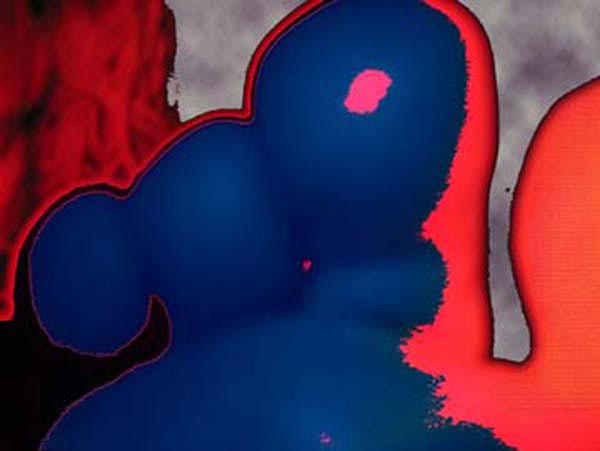
Watching The Fire, art by Cheryl Townsend
Less of Who I AmLuis Cuauhtemoc Berriozabal
Less of who I am is
|
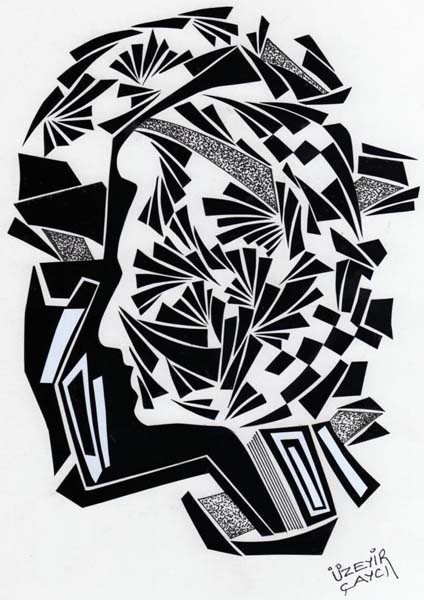
DESEN299 KUCUK, art by Üzeyir Lokman ÇAYCI
Twin PeaksBob Rashkow
There is a place, deep in the woods is there really a hell?
Dale is in love his request is granted
but out there, he will emerge--sans love & goodness
|
| Bob Rashkow reading his cc&d poem Twin Peaks |

Watch the YouTube video of Bob Rashkow reading this poem at the open mike the Café Gallery (at Gallery Cabaret’ in Chicago,, 3/14/12) |
| Bob Rashkow reads his cc&d 3/12 poem Twin Peaks |

Watch this YouTube video read live 11/20/11, at the Café open mike she hosts in Chicago |
ConfessionKenneth DiMaggio
What seemed like a curled up
And if you barely heard
you now saw how
|
Something Slides over the Water
Jenene Ravesloot |
| Jenene Ravesloot reading her cc&d poem Something Slides Over the Water Sestina Variatoin |

Watch the YouTube video of Jenene Ravesloot reading this poem at the open mike the Café Gallery (at Gallery Cabaret’ in Chicago,, 3/14/12) |

Watch the YouTube video of Jenene Ravesloot reading this poem at the open mike 5/23/12 at Gallery Cabaret’s the Café Gallery in Chicago, from the issue |

Supernatural, art by Rose E. Grier
Further Adventures of Rocketman the Nash Rambler of LoveBruce Matteson
I was sitting at Schwab’s lunch counter minding my own business
|
_Charlie Newman
the cast of Jersey Shore is not my kind God must exist
|
| Charlie Newman reading his cc&d poem |

Watch the YouTube video of Charlie Newman reading his cc&d poem at the open mike the Café Gallery (at Gallery Cabaret’ in Chicago, 3/28/12) |
A West Texas ThunderstormSheryl L. Nelms
grumbles the woodwork
rattles Stability
|

Lakes, art by Oz Hardwick
Too Freakin’ RealLinda Webb Aceto
Is that what mania is?
Is that what it is?
|

Sommer NR 1, art by the HA!man of South Africa
The Mad Hatter’s Tea Party RevisitedR. N. Taber
There once was a white rabbit
White Rabbit, he had contacts
‘Off with his head!’ Queenie
‘Try these dear,’ said Queenie,
‘They will probably make you ill,’
‘Off with his head!’ cried Queenie,
The little girl (with big ideas) loved
|
The Old HouseJohn Duncklee
Nestled in the shade of tall eucalyptus
Headquarters for Canada del Oro ranch
We gathered country that is full of houses now
I was in the old house a few times for coffee
It was just south of the old Steam Pump Ranch
Now there’s a bridge and cemented arroyo sides
Been watching the old house all through the years
The mountain is east of the front porch
Driving to town the other day I glanced over
The bulldozers had ripped up the tall eucalyptus
Another trip to town a week later.
|

31st Street View, art by Nick Brazinsky
Houdini SuspendedRochelle Lynn Holt
What they don’t understand is we escape:
underwater or above in cone
It’s almost as though we are dead,
No one or nothing can bruise us or scrape
Dreaming in sun on a green bed,
In darkness, we are the light shone
What they don’t understand is we escape:
|
No HomeJackson Burgess
I balanced on the edge of oblivion for forty days and forty nights
Dark sunrises and painless goodbyes have
No dogs allowed. No one is not alone.
When you and I looked out at the frostbitten void
All I ever wanted was a place to call my own–
|
GuiltJanet Kuypersedited from 1994 prose 06/23/11 Based on the 1994 short story publisahed in her 6" x 9" ISBN# book Close Cover Before Striking
I was walking down the street one evening,
Normally I don’t donate anything to homeless people,
I’m getting off the subject here...
Well,
Well,
I figured it had to be being on the bridge
And when I crossed,
|
 |
The poem above was perfpormed in the live poetry feature/show “Striking withg Nature and Humanity” by Janet Kuypers 06/25/01. |

Watch the YouTube video Published in her book Close Cover Before Striking, read (for future audio CD release) live at Striking with Nature and Humanity at Trunk Fest , in an outdoor Evanston IL feature 06/25/11 |

See the full YouTube video of Striking with Nature and Humanity at Trunk Fest, live 06/25/11, with this writing |
|
|

Watch the YouTube video of Kuypers reading this poem at the open mike 3/14/12 at Gallery Cabaret’s the Café Gallery in Chicago, from the Kodak |
dreams turned into nightmaresJanet Kuypersedited from 1994 prose 06/23/11 Based on the 1994 short story publisahed in her 6" x 9" ISBN# book Close Cover Before Striking
Analyze this.
You don’t care about your work.
God, why does it always feel like this?
Why are there times like this when you feel so alone?
Look at the dishes pile up.
Why does everything have to hurt you so much? Why do you go through this?
Oh, don’t even try to daydream It won’t stop, not until you do.
Can you resign yourself to this?
What is the good of anything that you’ve done? Try not to think of it. You’re so lonely.
All you’ve got left to you is your mind, When will it destroy you altogether?
When?
Why do you dream? Are you trying to escape reality?
I think you dream and dream
Pieces.
Can you create a new dream with what you have left?
But what the Hell do you need that hope for?
And those bad dreams,
You can’t face up to it, can you?
|
 |
The poem above was perfpormed in the live poetry feature/show “Striking withg Nature and Humanity” by Janet Kuypers 06/25/01. |

Watch the YouTube video Published in her book Close Cover Before Striking, read (for future audio CD release) live at Striking with Nature and Humanity at Trunk Fest , in an outdoor Evanston IL feature 06/25/11 |

See the full YouTube video of Striking with Nature and Humanity at Trunk Fest, live 06/25/11, with this writing |
|
|
 |
The poem below was perfpormed in the live poetry feature/show “IPB: the Impromptu Poetry on the Beach” by Janet Kuypers 06/29/11. |
Update 2011 on the Man who Loved me
Janet Kuypers |
 |
The poem above was also perfpormed in the live poetry feature/show “Celebrating with Song” by Janet Kuypers 07/12/01 at the Café. |

Watch the YouTube video from IPB: the feature 06/29/11 of Impromptu Poetry on the Beach |

See feature-length YouTube video of many poems read at Beach Poets from IPB: the Impromptu Poetry on the Beach feature 06/29/11 |
 Listen
Listen Or watch the YouTube video |

See the YouTube video of Kuypers from the lip camera 07/12/11 at Chicago ’s the Café in her feature Celebrating with Song |

See feature-length YouTube video 07/12/11 of Janet Kuypers performing her poetry at Chicago’s the Café weekly poetry open mic |

See the YouTube video from the lip camera of Kuypers’ feature Celebrating with Song on 07/12/11 at the Café in Chicago |
Ruminating
Janet Kuypers |
Janet Kuypers Bio
Janet Kuypers has a Communications degree in News/Editorial Journalism (starting in computer science engineering studies) from the UIUC. She had the equivalent of a minor in photography and specialized in creative writing. A portrait photographer for years in the early 1990s, she was also an acquaintance rape workshop facilitator, and she started her publishing career as an editor of two literary magazines. Later she was an art director, webmaster and photographer for a few magazines for a publishing company in Chicago, and this Journalism major was even the final featured poetry performer of 15 poets with a 10 minute feature at the 2006 Society of Professional Journalism Expo’s Chicago Poetry Showcase. This certified minister was even the officiant of a wedding in 2006. |

prose
the meat and potatoes stuff
A Moral DilemmaAnne Turner Taub
“Whew, thank the Lord I never had to make that kind of decision,” said Russell Sherman to his television set as he shut it off and glanced out of the window to see how his impatiens were doing. His mind was still on the movie—a young doctor in the emergency room of a large hospital was confronted with a difficult choice. Only one operating room was available but whom to give it to—a policeman with a wife and three children, or a hardened criminal with a long history of armed robbery, but whose wounds were of greater urgency.
|
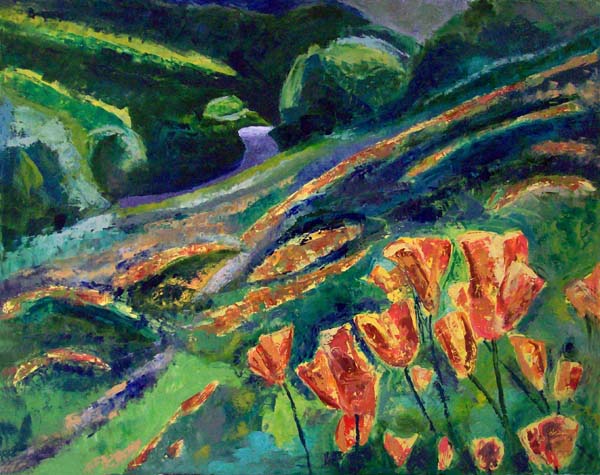
Mt. Diablo Poppies, painting by Brian Forrest
MoneyDerrick Sherwin
“You can take the girl out of the bar but not the bar out of the girl!” said the old Australian sagely.
|
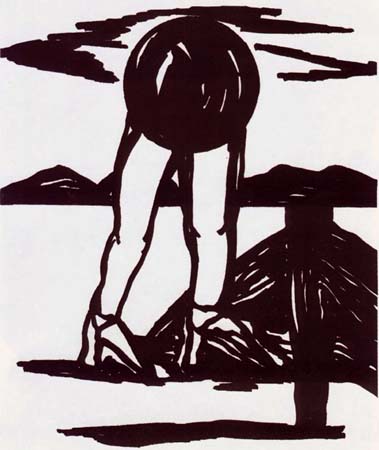
Sun in High Heels, art by Edward Michael O’Durr Supranowicz

Sail, art by Peter LaBerge
(who also has artwork at flickr)
Lost at SeaJim Meirose
The choppy sea sparkled with a million points of light reflected from the setting sun which now hung below the higher clouds, which all day had veiled it. Mary decided to sit abovedecks and watch the sun sink below the waves. It was a gentle time for her; it was a tender time, the end of twilight; the darkness would settle over her raising goosebumps, and then she would be ready for bed. John would go to bed first, before sunset, in the cabin below, having had a tough day of sailing, there having been a strong warm breeze. A day of cranking and pushing and pulling and stretching and raising his face to the overcast sky, which should have told him what kind of night it would be in the end; the clouds being a shroud, not lying but hanging, under the beauty of the blue sky which wasn’t really there anymore because it couldn’t be seen anymore. The blue sky was a shade, a wraith, a symbol of death, hiding above the clouds.
|


Anger MovesErica McBeth
You know, it’s funny what you think about sometimes. Today this bitch up at the station said something and I started thinking about this guard dog my daddy bought us once named Gemini. Now, why my daddy thought we needed a guard dog, I’ll never know. My daddy was the meanest son of a bitch that ever lived. And when I say that, I mean that with the sincerest respect. My daddy made sure I knew things about this world. That was his responsibility and he took that shit seriously.
|

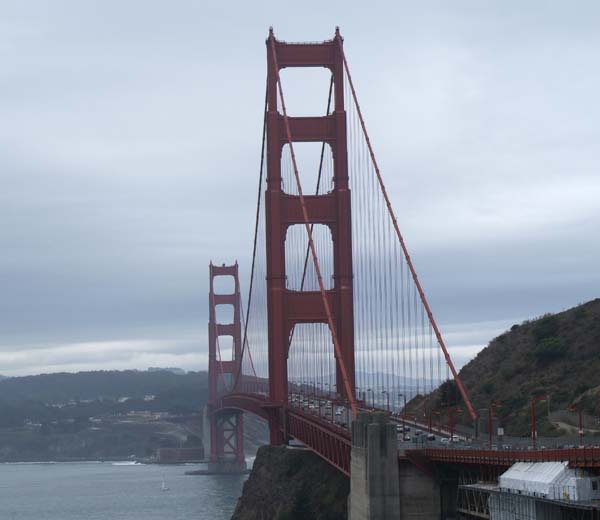
I Am the Homeless PieceBrian LooneyI want to be everywhere all at once. I want to be on forever, circulating through every vein. I want to be at rest in glassy pages, hummed and hawed about. I want to feel the currents, to have a home. They turned me away from the golden gates, eyeing my rags with distaste. I rang the bell with my dirty index, and they were shocked by my audacity. A tin voice finally answered; I don’t know whose it was. It thanked me for coming, then it told me to leave. I am the homeless piece: riding the railways, cinching my belt, blowing into harmonicas. A nip at the bottle, and I feel less lost. A drag at a smoke, and I’m at rest anywhere. My toes wiggle through my shoes. I was just looking for work.
|
Brian Looney BioBrian Looney was born 12/2/85 and is from Albuquerque, NM. He likes it when Lady Poetry kicks him in the head. The harder the better. Check out his website at Reclusewritings.com.
|
A Long Drop and a Short StopEric Bonholtzer
Victor, for the life of him, couldn’t figure out how he’d gotten there. It was as if he’d been catapulted into some strange parallel universe with no recollection of how it happened, everything an amnesiac blur in his mind. But the worst part was, despite the uncanny oddness of his situation, Victor seemed to know the place. His surroundings resembled his old hometown so closely that, for a second, he was sure he was back in Kansas. Tears welled in his eyes as he took it all in. There was Peter’s Pharmacy and Old Man Kelly’s Taxidermy standing juxtaposed in the still night air, and the central park, which had played host to so many town events throughout the years, stretching out before him. Victor, though, even in spite of the disturbing peculiarity of it all, felt truly at home, at peace. It was only after looking around curiously that a real sense of disquiet began to set in.
“Oh God,” one of the witnesses said with a kind of reverence.
|

Opaque, art by Aaron Wilder
portions of the novel
Trish Weil |
The Pane Glass War
Robert W. Gallant |
g’ joob g’ goo—goo g’ joob
(I am the egg-man, ooh they are the egg-men, ooh)
Phillip Gardner
g’ joob g’ goo—goo g’ joob
Phillip Gardner |

Debra Purdy Kong, writer, British Columbia, Canada I like the magazine a lot. I like the spacious lay-out and the different coloured pages and the variety of writer’s styles. Too many literary magazines read as if everyone graduated from the same course. We need to collect more voices like these and send them everywhere.
Children, Churches and Daddies. It speaks for itself. Write to Scars Publications to submit poetry, prose and artwork to Children, Churches and Daddies literary magazine, or to inquire about having your own chapbook, and maybe a few reviews like these.
what is veganism? A vegan (VEE-gun) is someone who does not consume any animal products. While vegetarians avoid flesh foods, vegans don’t consume dairy or egg products, as well as animal products in clothing and other sources. why veganism? This cruelty-free lifestyle provides many benefits, to animals, the environment and to ourselves. The meat and dairy industry abuses billions of animals. Animal agriculture takes an enormous toll on the land. Consumtion of animal products has been linked to heart disease, colon and breast cancer, osteoporosis, diabetes and a host of other conditions. so what is vegan action?
We can succeed in shifting agriculture away from factory farming, saving millions, or even billions of chickens, cows, pigs, sheep turkeys and other animals from cruelty. A vegan, cruelty-free lifestyle may be the most important step a person can take towards creatin a more just and compassionate society. Contact us for membership information, t-shirt sales or donations.
vegan action
Children, Churches and Daddies no longer distributes free contributor’s copies of issues. In order to receive issues of Children, Churches and Daddies, contact Janet Kuypers at the cc&d e-mail addres. Free electronic subscriptions are available via email. All you need to do is email ccandd@scars.tv... and ask to be added to the free cc+d electronic subscription mailing list. And you can still see issues every month at the Children, Churches and Daddies website, located at http://scars.tv
MIT Vegetarian Support Group (VSG)
functions: We also have a discussion group for all issues related to vegetarianism, which currently has about 150 members, many of whom are outside the Boston area. The group is focusing more toward outreach and evolving from what it has been in years past. We welcome new members, as well as the opportunity to inform people about the benefits of vegetarianism, to our health, the environment, animal welfare, and a variety of other issues.
Dusty Dog Reviews: These poems document a very complicated internal response to the feminine side of social existence. And as the book proceeds the poems become increasingly psychologically complex and, ultimately, fascinating and genuinely rewarding.
Dusty Dog Reviews: She opens with a poem of her own devising, which has that wintry atmosphere demonstrated in the movie version of Boris Pasternak’s Doctor Zhivago. The atmosphere of wintry white and cold, gloriously murderous cold, stark raging cold, numbing and brutalizing cold, appears almost as a character who announces to his audience, “Wisdom occurs only after a laboriously magnificent disappointment.” Alas, that our Dusty Dog for mat cannot do justice to Ms. Kuypers’ very personal layering of her poem across the page.
Fithian Press, Santa Barbara, CA Indeed, there’s a healthy balance here between wit and dark vision, romance and reality, just as there’s a good balance between words and graphics. The work shows brave self-exploration, and serves as a reminder of mortality and the fragile beauty of friendship.
Mark Blickley, writer You Have to be Published to be Appreciated. Do you want to be heard? Contact Children, Churches and Daddies about book or chapbook publishing. These reviews can be yours. Scars Publications, attention J. Kuypers. We’re only an e-mail away. Write to us.
The Center for Renewable Energy and Sustainable Technology The Solar Energy Research & Education Foundation (SEREF), a non-profit organization based in Washington, D.C., established on Earth Day 1993 the Center for Renewable Energy and Sustainable Technology (CREST) as its central project. CREST’s three principal projects are to provide: * on-site training and education workshops on the sustainable development interconnections of energy, economics and environment; * on-line distance learning/training resources on CREST’s SOLSTICE computer, available from 144 countries through email and the Internet; * on-disc training and educational resources through the use of interactive multimedia applications on CD-ROM computer discs - showcasing current achievements and future opportunities in sustainable energy development. The CREST staff also does “on the road” presentations, demonstrations, and workshops showcasing its activities and available resources. For More Information Please Contact: Deborah Anderson dja@crest.org or (202) 289-0061
Dorrance Publishing Co., Pittsburgh, PA want a review like this? contact scars about getting your own book published.
 The magazine Children Churches and Daddies is Copyright © 1993 through 2012 Scars Publications and Design. The rights of the individual pieces remain with the authors. No material may be reprinted without express permission from the author. 
Okay, nilla wafer. Listen up and listen good. How to save your life. Submit, or I’ll have to kill you.
Dorrance Publishing Co., Pittsburgh, PA: “Hope Chest in the Attic” captures the complexity of human nature and reveals startling yet profound discernments about the travesties that surge through the course of life. This collection of poetry, prose and artwork reflects sensitivity toward feminist issues concerning abuse, sexism and equality. It also probes the emotional torrent that people may experience as a reaction to the delicate topics of death, love and family. “Chain Smoking” depicts the emotional distress that afflicted a friend while he struggled to clarify his sexual ambiguity. Not only does this thought-provoking profile address the plight that homosexuals face in a homophobic society, it also characterizes the essence of friendship. “The room of the rape” is a passionate representation of the suffering rape victims experience. Vivid descriptions, rich symbolism, and candid expressions paint a shocking portrait of victory over the gripping fear that consumes the soul after a painful exploitation.
Dusty Dog Reviews (on Without You): She open with a poem of her own devising, which has that wintry atmosphere demonstrated in the movie version of Boris Pasternak’s Doctor Zhivago. The atmosphere of wintry white and cold, gloriously murderous cold, stark raging cold, numbing and brutalizing cold, appears almost as a character who announces to his audience, “Wisdom occurs only after a laboriously magnificent disappointment.” Alas, that our Dusty Dog for mat cannot do justice to Ms. Kuypers’ very personal layering of her poem across the page.
|


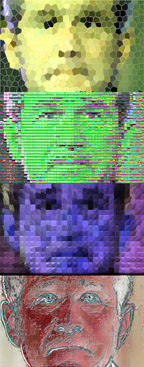 “AC/DC??”
“AC/DC??”